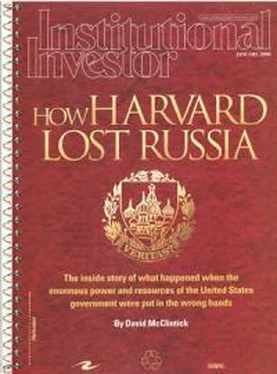How close were Larry Summers and Andrei Schleifer? According to former Boston Globe economics correspondent David Warsh, Summers and Schleifer “were among each other’s best friends,” and Summers taught Schleifer “as an undergraduate, sent him on to MIT for his PhD, took him along on an advisory mission to Lithuania in 1990, and in 1991, shepherded his return to Harvard as full professor, where he was regarded, after Martin Feldstein and Summers, as the leader of the next generation.”
The furor about Andrei Shleifer shadow dealings in Russia contributed to the ouster of Summers from the Harvard presidency. It also exposed sad fact that neoclassic economics represents a dangerous sect which if not exactly mafia is pretty much borderline phenomenon. Somewhat similar with Lysenkoism
Academic Mafiosi as a Social Class
The cynical view is that "Rape of Russia" was a Mafiosi style operation, which was conducted using s Trojan horses special class of Mafiosi, academic economics. This might well have been the intent (in best "disaster capitalism" style of thinking). Instead of helping post-Soviet nations develop self-reliant economies, writes Marshall Auerback,
“the West has viewed them as economic oysters to be broken up to indebt them in order to extract interest charges and capital gains, leaving them empty shells.”
Corruption and local oligarchy were natural allies of this process which was, in essence, the process of Latin-Americanization of post Soviet space. And off-shore safe heavens were the tool. They partially failed in Russia as some of the most notorious deals of this periods (especially in mineral recourses and oil areas) were reversed in 2000-2008, but were quite successful in Ukraine, Georgia, Latvia and several other post Soviet republics. The external debt of those is just staggering. As Professor Michael Hudson noted:
It may be time to look once again at what Larry Summers and his Rubinomics gang did in Russia in the mid-1990s and to Third World countries during his tenure as World Bank economist to see what kind of future is being planned for the U.S. economy over the next few years.
Throughout the Soviet Union the neoliberal model established “equilibrium” in a way that involved demographic collapse: shortening life spans, lower birth rates, alcoholism and drug abuse, psychological depression, suicides, bad health, unemployment and homelessness for the elderly (the neoliberal mode of Social Security reform).
Here is one apt comment about the real nature of economic professors from Harvard and other nice places from the comments to post Economists Fall Back Into Neoclassical Stupor …( naked capitalism. January 18, 2011):
Hugh:
I echo lambert’s and scraping by’s sentiments. The economics profession is not about an analysis of our economy that can make reasonable predictions about it. Economics and economists are enablers of the con and validators of kleptocracy. They say the many must make do with less and do not say that the result of this policy will be the few will have more.
These are not innocent, unworldly types tied to outdated and obsolete ideas. They are abettors and apologists for the greatest economic crimes in human history. We should call and treat them for what they are: criminals. Kleptocracy is not a some time thing. It is not a label you apply occasionally. Kleptocracy is a system. The looters can’t function without corrupt politicians, a complacent propagandizing media, or complicit enabling academics. With kleptocracy, there is no middle ground. You either stand with the looters or their victims. I think this is the critical choice we all must make.
Another pretty telling quote ( from brilliant satire Blacklisted Economics Professor Found Dead NC Publishes His Last Letter « naked capitalism):
Q: Is it really plausible that economists threaten top banks that in the absence of some kind of payoff, they will change the theories they teach in a direction that is less favorable to the banks?
A: There are certainly cases in history of the following sequence:
a. Economist E espouses views that are less favorable to certain special interest groups S. Doing so threatens the ability of S to extract rent from the public.
b. Later, E changes his view, thereby withdrawing the prior threat.
c. Still later, E is paid large amounts of money by representatives of S in exchange for services that do not appear particularly onerous.
For example, let E = Larry Summers and let S = the financial services industry. In 1989 E was (a) a supporter of the Tobin tax, which threatened to reduce the rent extracted by S. This threat was apparently later withdrawn (b), and in 2008 E was paid $5.2 million (c) in exchange for working at the hedge fund D. E. Shaw (an element of S) for one day a week.
However, it is naturally more difficult to witness the negotiations in which specific threats were appeased with specific future payouts. This is a problem that also bedevils Public Choice theory, in which it is likewise difficult to show exactly how a particular politician is remunerated in exchange for threatening businesses with anti-business legislation. The theory assures us that such negotiations occur, although they are difficult to observe directly. Perhaps further theoretical advances will help us to close this gap.
Q: Isn’t it offensive to assume that economists, for motives of personal gain, shade their theoretical allegiances in the directions preferred by powerful interest groups?
A: How could it ever be offensive to assume that a person acts rationally in pursuit of maximizing his or her own utility? I’m afraid I don’t understand this question.
Academic Mafiosi as Byproduct and Simultaneously Enablers of Neoliberalism
Disappearance of a formidable opponent of unrestricted looting of developing countries that USSR formally represented on the the world scene essentially released all moral stops and considerations both inside the USA and outside. The triumph of neoliberalism
And former USSR republics were the first victims of new super-aggressive neoliberal "new normal". Despite crocodile tears about corruption, o ur world is being reshaped, in sinister fashion, by wide open capital markets and an international banking network that exists to launder hundreds of billions of dollars in ill-gotten gains stolen by government officials and oligarchs in "weaker" countries. In other words, corruption is an immanent feature and principal tool of neoliberalism in developing countries and xUSSR area.
In a broad sensethe term Harvard mafia means corrupt (mostly neoclassical and supply side) academic economists which enjoy revolving door with government and get most of the income from the financial services industry. There are multiple documented examples when their activity was pretty close to activities regulated by RICO statute. Recent film of Charles Ferguson Inside Job is nice illustration of behavior of those predators in academic clothing
In a narrow senseHarvard mafia is the team of (mainly) neoclassical economists and "experts" who disastrously advised the Russian government on conversion of centrally managed "command economy" to more Western model in the 1990s. While Harvard mafia is probably the most notorious in its like to the economic rape of Russia, Chicago University economic school probably played a similar role for the USA. In this sense we can speak about Chicago economists mafia as well (what a surprise ;-)
Under pretext of showing the Russians how to convert command type economy to neoliberal model, and how to controls corruption, the gang-style rape of the country was inflicted on its unsuspecting citizens with poverty raising from 2% to 40% of the population. World have witnessed Russia losing half of its total output, plunging it into a depression deeper than the U.S. Great Depression. Please read Anne Williamson’s testimony. Here is one quote:
Читать дальше






![Джонатан Димблби - Barbarossa - How Hitler Lost the War [calibre]](/books/385421/dzhonatan-dimblbi-barbarossa-how-hitler-lost-the-w-thumb.webp)





